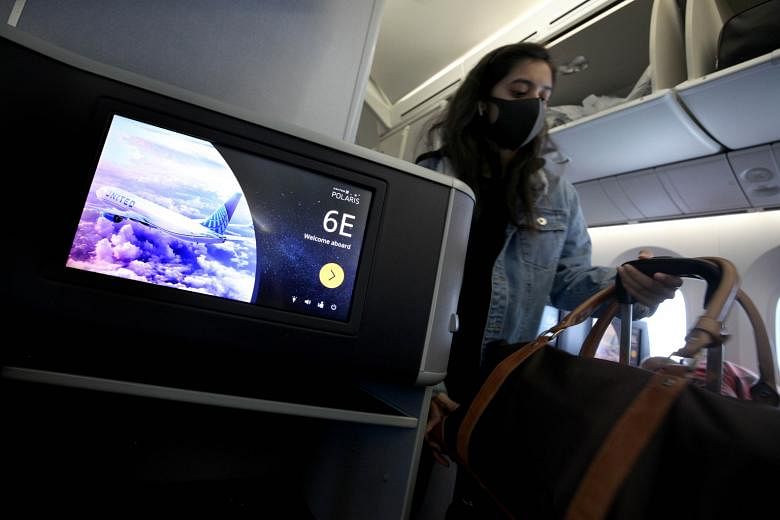NEW DELHI • Frequent flying is not so much of a thing right now, but loyalty programmes are, in many cases, getting better as airlines fight to keep customers and generate sorely needed revenue after the coronavirus ransacked travel.
Introduced nearly 50 years ago, air miles are a way for the industry to make money. Aside from locking in repeat customers by helping them accumulate trips, airlines sell miles to credit card companies, banks, hotels and other businesses for billions of dollars.
This revenue source is crucial now that the pandemic has thrown aviation into crisis, and airlines are piling in with new offers, such as bonus points and lowering thresholds to qualify for more perks.
Some are also increasing the number of points members earn from shopping, and expanding partnerships so there are more opportunities to rack up miles.
That means it should take less effort to secure reward flights or upgrade to business class.
Delta Air Lines is providing four times the usual number of miles for purchases with American Express cards at US supermarkets, while Etihad Airways is offering up to US$400 (S$565) and 5,000 miles for passengers who postpone flights scheduled before July 31 and has points deals for online shopping and cashback offers with brands such as KFC and Pizza Hut.
"These programmes appeal to a carrier's very best revenue-producing customers, so there is abundant need to keep these consumers happy," said Mr Jay Sorensen, a former Midwest Airlines executive who is now president of IdeaWorksCompany consultancy. "In the near term, consumers will see a windfall of cheap travel for redeeming points or miles."
According to a 2017 study by Stifel Financial, airlines can get up to 2.5 US cents for every mile, so they are a rich source of liquidity.
Banks then benefit from annual charges on credit cards and merchant fees when cards are used.
JetBlue Airways this month sold loyalty points to Barclays for US$150 million. The airline received US$475 million from such deals last year, according to Stifel analyst Joe DeNardi. American Airlines Group got US$4.3 billion and Delta reaped US$4.2 billion last year, he said.
American Airlines said on Tuesday that its AAdvantage loyalty programme - "the biggest asset we have in the company" - has a value of as much US$30 billion, and that it is negotiating with the US Treasury Department to use at least part of it as collateral for a multibillion-dollar loan.
Bloomberg News reported last month that the Treasury Department was in talks with some carriers about accepting loyalty programmes as collateral as they rushed to raise funds.
Cathay Pacific Airways, which flew just 458 passengers a day last month, is extending Marco Polo memberships and unused mid-tier benefits - access to business class lounges, for example - by 12 months.
United Airlines Holdings has extended Premier memberships through 2022 and made it easier to qualify for reward flights and earn points.
Emirates is letting elite Skywards members maintain their statuses by fulfilling just 70 per cent of their tier travel requirements, as well as giving 20 per cent bonus tier miles. This comes as the world's biggest long-haul carrier considers thousands of job cuts.
MILES BETTER
"It's a good thing for consumers and for the airlines," said Mr Steve Saxon, a Shanghai-based partner at McKinsey & Co. "Being able to earn miles for everyday spending makes flight redemptions much more accessible" and carriers can get revenue for seats that might otherwise go empty, he said.
Emirates' members account for almost 45 per cent of the carrier's commercial revenue, according to Mr Nejib Ben Khedher, divisional senior vice-president of Emirates Skywards.
Abu Dhabi's Etihad says loyalty programmes help it "obtain valuable data on each guest which allows us to tailor the experience", while Singapore Airlines "does not take their loyalty for granted".
Singapore Airlines last week reported a record loss.
Qatar Airways is offering a so-called status-match with some airlines, and planning new banking and hotel partners.
Cheap offers will extend until the end of this year for domestic routes and through next spring for longer-haul international routes, Mr Sorensen said.
Some airlines may cut down non-travel awards to save cash, or offer discounted business class seats to loyalty members as companies reduce premium travel, he added.
"Loyalty programmes will play an essential role in the industry's recovery by creating incentives for customers to restart travelling," said Mr Renato Ramos, director for loyalty at Star Alliance, a grouping of airlines that includes the likes of Air China, Lufthansa and United.
"In addition to the existing perks for frequent fliers, we are looking at ways to find new benefits."
One risk is there is little value left in miles or co-branded credit cards if the issuing airline collapses, which is a very real threat, as the likes of Virgin Australia Holdings, Avianca Holdings and others show.
"The airline industry itself, among them the legacy airlines, will be transformed after this earthquake-like shock," said Mr Pankaj Pandit, an independent consultant based in the Indian city of Bangalore. "Many legacy airlines may simply vanish, so naturally their appendage, the loyalty programmes, will also wither away," he said.
Some are trying to incentivise members to spend on associated credit cards and transfer points in from other partners such as hotels, according to Mr Gary Leff, co-founder of InsideFlyer.com, who writes on loyalty programmes.
"There will be empty seats to fill and airlines will need to rely on their programmes to make generous offers in order to bring back consumers," Mr Leff said.
"Expect loyalty programmes to run aggressive promotions, and travel businesses to spend heavily on marketing to their frequent fliers and frequent stay guests. In addition, with all of this excess inventory, it'll be easier for consumers to use their points. This will last as long as the downturn lasts."
BLOOMBERG

